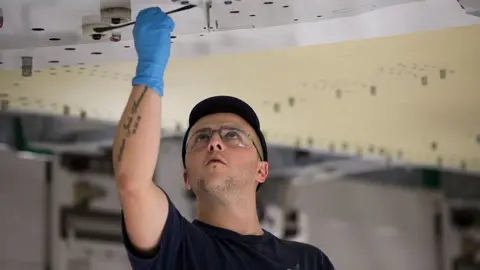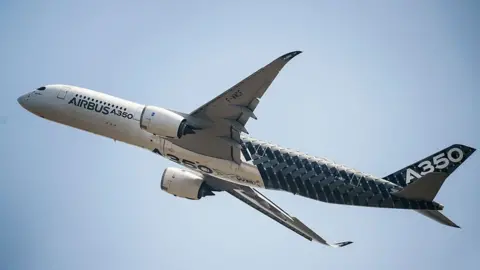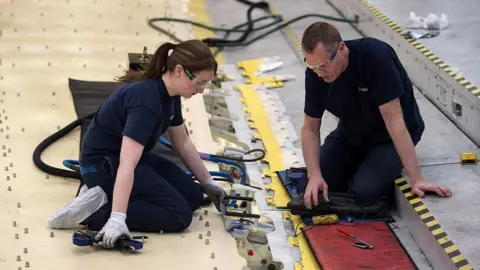No-deal Brexit 'could ground aircraft'
 Getty Images
Getty ImagesThe head of the UK aerospace industry's trade body has warned that a no-deal Brexit would be a "worst case scenario" that could ground aircraft made with UK-made parts.
"No deal is the worst possible outcome, you need to do the deal," said ADS chief executive Paul Everitt.
He said that regulatory alignment with the EU was the biggest concern for the industry in the short term.
At the moment, UK-made parts for planes are certified by a European body.
UK manufacturing is currently covered by the European Aviation Safety Agency (EASA). But if the country leaves the EU without a deal, then from 30 March next year UK aircraft components would not be covered - either in the EU or in other countries such as the US and China.
This would mean that without recognised safety certificates any aircraft using those parts could be grounded.
"That is the extreme case", said Mr Everitt, "but it's not scare-mongering [to say that] aircraft will not fly."
His comments come as carmaker Jaguar Land Rover warned that a "bad" Brexit deal would threaten £80bn worth of investment plans for the UK and may force it to close factories.
A spokesman for Theresa May said that the Prime Minister was aware of the views of business, and a forthcoming white paper policy document would give more details on the proposed relationship between the UK and EU.
"The PM has been very clear that we take the views of business seriously and we also know the importance of providing certainty as we leave the EU," the spokesman said.
 Getty Images
Getty ImagesHe said it was vital that UK regulatory agencies began drawing up contingency plans with EASA.
In a letter last month to the European Commission, ADS said that "EASA and the CAA [the UK's Civil Aviation Authority] need to urgently begin technical and contingency planning.... separate to the political negotiations."
However, so far the European Commission has refused to allow any technical discussions between UK and EU aviation authorities.
Any such talks could take up to nine months to avoid potential pitfalls come March 2019, meaning they need to start almost immediately, "otherwise they are not going to happen in time," said ADS chief economist Jeegar Kakkad.
 Getty Images
Getty ImagesADS argues that the UK aerospace industry - which generated £35bn in turnover and accounted for £30bn in exports last year - needs regulatory alignment with the EU and continued membership of EASA.
The industry body wants the UK to remain part of the EU's customs union in order to maintain frictionless borders.
Under the government's current border proposals, the ADS estimates that once the UK leaves the EU costs for the industry could rise by £2.3bn a year.
"From an industrial point of view, we see the potential for serious disruption and costs which will make [all of] Europe less competitive," said Mr Everitt.
A number of big businesses including Airbus, BMW, Siemens and Jaguar Land Rover, have recently issued similar calls for clarity on Brexit, and warned that without a deal investment in the UK could suffer.
